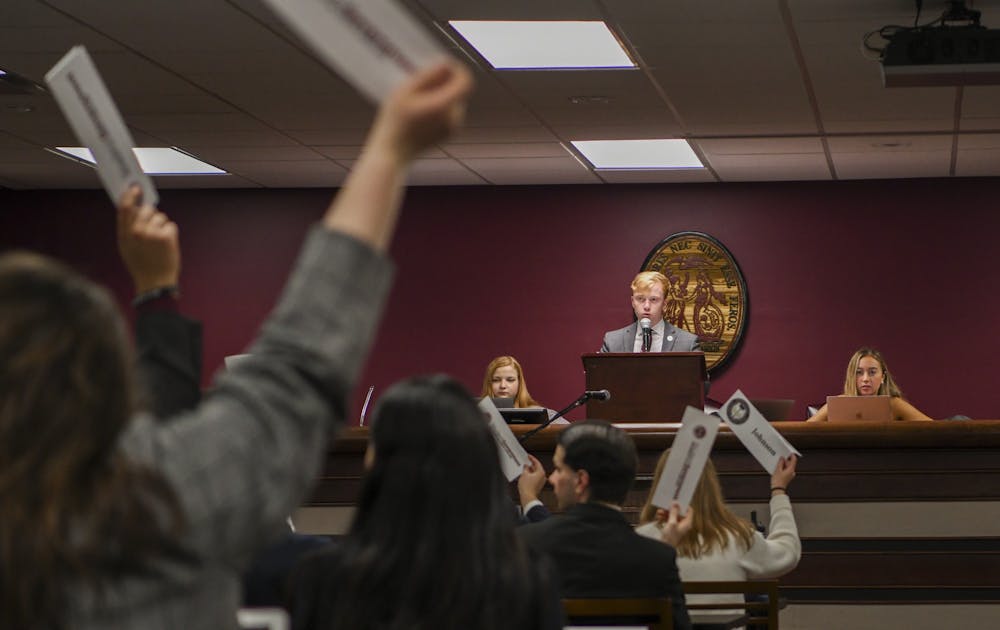At Wednesday night’s meeting, the student senate discussed numerous changes to the Student Government codes.
One of these changes was introduced by chairman Morgan McDonald. This recommendation regarded student organizations and their submitted requests for funds from the Student Government.
Currently, a comptroller, a position in the office of the treasurer who helps student organizations request funds, can edit a request for funds from a student organization until the finance committee decides on whether or not to send the request to the student senate.
This recommendation would make it so that a comptroller cannot edit the document once the request for funds is being discussed by the finance committee.
“I would like to prevent finance committee from ever having influence over what the request says. That's more of the office of the treasurer, that's what comptrollers are doing to help an organization file a request, but that's not really in the senate's jurisdiction,” McDonald said.
McDonald’s second recommendation would amend the Student Government’s internal monetary fund (IMF) restrictions by allowing for the executive positions of Student Government to make requests from the IMF to fund spontaneous events that weren’t on the budget originally.
“The speaker can request for senate, all the executives can request and the chief justice can request for anything that comes up throughout the year that they needed, that they couldn't foresee happening and couldn’t budget for,” McDonald said.
This recommendation would also allow the steering committee to request funds from the IMF by a majority vote. The steering committee is made up of the chairs of all the other committees that represent the different schools of the university.
“One of the things we saw this semester was, senate outreach was a big part of what a lot of the steering delegations did. We saw a lot of tabling events, things that required funding, and we saw a lot of IMF requests coming out of it. So this would allow the steering delegation to, by a majority vote, request for an IMF request,” McDonald said.
McDonald’s final recommendation would reduce the number of comptrollers the office of the treasurer can have. As of now, there can be no less than four and no more than 14 comptrollers. McDonald’s recommendation would change it from five to 10 comptrollers.
One of these comptrollers could serve as the chief comptroller, who would supervise the rest of the comptrollers and be appointed by the treasurer.
Chairman Patrick Greene presented a change to the codes that would call for the elections commission to report weekly during elections to the student senate and a proposed rewrite of Chapter 2 of the Student Government codes.
Greene said the elections commission report is meant to create “accountability” of the elections commission to the senate. He said this would make it known the commission is "running elections as fair and equitably as possible."
“The executive officers each week will come in and give a report and they have action items that they've accomplished, that they're looking to accomplish, and we're able to see the progression over time," Greene said. "We've never seen that from elections commission before.”
Chapter 2 of the codes cover the student senate. Greene said he wanted to make the chapter more understandable for future Student Government members.
“One of my objectives this year was to clear up codes, confusion and stuff like that for future years, so that they would be able to better govern, more efficiently and effectively with the way that we currently practice,” Greene said. “There were not many substantive changes ... it was basically the way we operate, but actually writing it down so that it was easier to understand and easier for people to operate.”
Speaker pro tempore Brandon Patrick said he took issue with multiple additions to Greene’s rewrite of the codes. He said some of the additions Greene made were “ambiguous.”
“I noticed a few wording and phrasing changes, in addition to some odd caveats added to certain sections, that add a lot of ambiguity as to how a lot of things can be interpreted in the codes,” Patrick said. “Ambiguities are problematic because they can cause hypothetical interpretation disputes, and vague codes can also be misused for dishonest purposes.”

